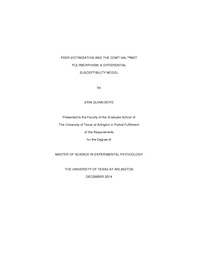
ATTENTION: The works hosted here are being migrated to a new repository that will consolidate resources, improve discoverability, and better show UTA's research impact on the global community. We will update authors as the migration progresses. Please see MavMatrix for more information.
Show simple item record
| dc.contributor.author | Boyd, Erin Q. | en_US |
| dc.date.accessioned | 2015-07-01T17:50:33Z | |
| dc.date.available | 2015-07-01T17:50:33Z | |
| dc.date.issued | 2014-12 | |
| dc.date.submitted | January 2014 | en_US |
| dc.identifier.other | DISS-12943 | en_US |
| dc.identifier.uri | http://hdl.handle.net/10106/24954 | |
| dc.description.abstract | The link between peer victimization and various health related negative outcomes ranging from physical to psychological has been well established in the literature (Hodges & Perry, 1999; Rigby, 2001). While there are many individual differences in the observed relationship, few have explored the role of Catechol-O-methyl transferase (COMT) gene, val158met, within this relationship. Prior research has shown that COMT is involved in altered stress reactivity, internalizing problems, and poor health outcomes (Armbruster et al., 2012; Hagen et al., 2006; Reuter & Hennig, 2005). This thesis explored the influence of the COMT gene on the relationship between peer victimization and adverse outcomes in a sample of 149 adolescents (Mage = 12.67). Regression analyses show that overall victimization as well as physical, verbal, and indirect subtypes, predicted poorer health outcomes, internalizing problems, and somatic complaints. COMT allelic variants, specifically individuals with at least one MET allele, were found to moderate the relationship between peer victimization and severity of health symptoms, internalizing problems, and somatic complaints. COMT, gender, and peer victimization significantly interacted to predict increased somatic complaints. Hierarchical linear model revealed that COMT and victimization interacted to predict altered stress reactivity within the Trier Social Stress Test (TSST); victimized individuals consistently showed blunted cortisol response. Further, victimized girls showed lower cortisol responses compared to non-victims. Marginally, COMT interacted with victimization and the TSST to show that homozygous MET individuals with a low history of victimization show a blunted response. These results provide evidence that the COMT polymorphisms differentially influence victimization and negative health outcomes, explaining why some individuals are more susceptible to the adverse effect of bullying. | en_US |
| dc.description.sponsorship | Jensen-Campbell, Lauri A. | en_US |
| dc.language.iso | en | en_US |
| dc.publisher | Psychology | en_US |
| dc.title | Peer Victimization And The COMT Val158met Polymorphism: A Differential Susceptability Model | en_US |
| dc.type | M.S. | en_US |
| dc.contributor.committeeChair | Jensen-Campbell, Lauri A. | en_US |
| dc.degree.department | Psychology | en_US |
| dc.degree.discipline | Psychology | en_US |
| dc.degree.grantor | University of Texas at Arlington | en_US |
| dc.degree.level | masters | en_US |
| dc.degree.name | M.S. | en_US |
Files in this item
- Name:
- Boyd_uta_2502M_12943.pdf
- Size:
- 784.8Kb
- Format:
- PDF
This item appears in the following Collection(s)
Show simple item record


